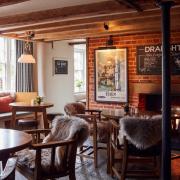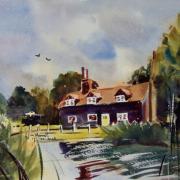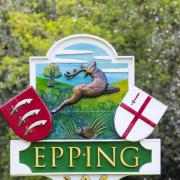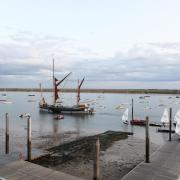By Julie Lucas
The sight of a royal coat of arms is guaranteed to have an impact. We meet some of the local members of a very exclusive club: the Royal Warrant Holders
I am spreading marmalade on my toast, Tiptree orange and tangerine to be exact, made by Wilkin & Sons. As well as being delicious, the products come with a royal seal of approval: a Royal Warrant. It’s a mark that is seen as a sign of quality, of the finest workmanship or products. Well, if it’s good enough for the Queen, then it’s good enough for my breakfast table.

The history of Royal Warrants can be traced back centuries. They were first created during the medieval period when tradespeople would compete for the monarch’s favour. Today, there are around 850 warrants held by around 750 holders, ranging from small independent craftspeople to international companies. They represent a varied cross-section of trade from dry cleaners to fishmongers and agricultural machinery to computer software.
Interestingly, in 1684 goods and services included a haberdasher, an operator for the teeth and a ‘goffe-club maker’. Essex currently has 12 companies listed, offering a diverse range of services. Need horse feed fit for a royal mount? Then contact Dengie Crops. Want a mount maker for objects and works of art? Colin Bowles, Antiques, Art and Conservation is your man. Something for the garden? Then head to Langthorns Plantery.
The Queen decides which members of the Royal Household may grant the Royal Warrant. Currently there are only two grantors, the Queen and the Prince of Wales.
Entry into this exclusive club follows strict criteria. The applicant must have supplied goods or services to the Royal Household for at least five years out of the past seven and have an ongoing trading arrangement. Professional services, such as bankers or solicitors, are not eligible, nor are newspapers or magazines, so sadly no seal of approval for Essex Life. Applications open between May and June each year and are then scrutinised by the Royal Household Warrants Committee.
A Royal Warrant is initially granted for up to five years to a named individual at a company. Known as grantees, they are then given the authority to display the royal arms; the Lord Chamberlain's Rules govern how it may be displayed. The warrant is then reviewed during the fourth year.
Around 20 to 40 Royal Warrants are cancelled each year, but a similar number of new ones are granted. Overseeing the process is the Royal Warrant Holders Association, formed in 1840 to represent members and protect the institution. It is separate from the Royal Household, but assists with the application process as well as organising business and networking events.

One famous Essex family have held a Royal Warrant for over a century. The Wilkin family have been making preserves since 1885. Their conserves and condiments grown from traditional English fruits caught the attention of the Royal Household. They received the first Royal Warrant from George V in 1911 and remain Royal Warrant holders as purveyors of Tiptree products to the Queen.
In 2010, the Queen visited Tiptree to mark the company’s 125th anniversary. Walter Scott, now chairman of the company, describes it ‘as a surreal moment’. He continues, ‘We entered the factory to an unexpected and very enthusiastic round of applause from the waiting people. During the tour, Her Majesty spoke with genuine interest and knowledge to everyone she encountered; it went very quickly.’

Family business Langthorns Plantery in Little Canfield specialise in quality garden plants and trees, and it’s their eye for the more unusual and rare species that perhaps caught the attention of the Queen’s gardeners. A pivotal moment came in 2004 with an opportunity to supply the royal palaces after owner and head planter Ed Cannon met the head gardener of Buckingham Palace, and in 2017, the company was awarded the Royal Warrant to the Queen as a supplier of ornamental plants, shrubs and trees.
‘It was the proudest moment of my professional career,’ says Ed. ‘As a warrant holder we want and need to maintain the highest standards, and as such there is a continual focus on sustainability and quality. We are encouraged to scrutinise every part of our operations and evolve and adapt where possible.’
That includes keeping records of all the plants they supply. Ed says he is permanently ‘picking head gardener, Mark Lane's brain and vice versa’ and has met Prince Charles who he says is ‘hugely knowledgeable’ on plants. He laughs when I ask him about favourite plants and won’t reveal. ‘There is such a depth and breadth of plants that they use, there’s over 40 acres of garden at Buckingham Palace.’

But Her Majesty is not the only one celebrating a major milestone this year, coincidentally, it’s the 140th anniversary of Maldon Salt. Four generations of the Osborne family have been hand harvesting the naturally formed salt flakes that have become the company’s signature. The Queen visited Maldon’s salt works in 2010, and it was just two years later that the brand was granted a Royal Warrant as the official purveyors of sea salt.

It has seen the company develop into a globally recognised brand, loved not only by chefs and food lovers around the world but also the actress Cameron Diaz who said it was ‘the best Christmas gift' she ever got.
It was a disaster that provided an opportunity and the Royal Warrant for specialist plasterer Jon Joy. ‘We were watching the Windsor Castle fire on television in 1992 at home and my dad said, “We could get a call about this”,’ says Jon, who is based near Harlow.

‘We did get a call, and we ended up working on the fire damage for the duration. Our main works were the new private chapel, octagon anti room and new corridor where we carried out the new Downesian gothic plasterwork for the best part of two years. The job won all the industry awards. My dad was presented to the Queen and I was honoured with a RVM (Royal Victorian Medal) in the new year’s honours.’ They are the only plasterers to hold a Royal Warrant as specialist plasterers, conservators and restorers to the Queen.
‘Being warrant holders is an invitation to quite an exclusive club, there are all sorts of annual functions and banquets one could easily become very involved in. The warrant is a very strong testimonial to the quality of work or products a holder produces; you really can’t have a better recommendation than from the Queen.

‘It can also be a poison chalice, presenting someone with your business card complete with royal crest can make people think you are too good for their work and potentially more expensive – it’s not the case. The majority of people are interested to say the least. We have worked on all the royal residences in London, Windsor Castle, Big Ben, livery halls and many fine country and town houses.
‘Being a warrant holder has been the greatest acknowledgment for us, we have been proud to hold it. I am always pleased when people refer to me as the Queen’s plasterer.’


























